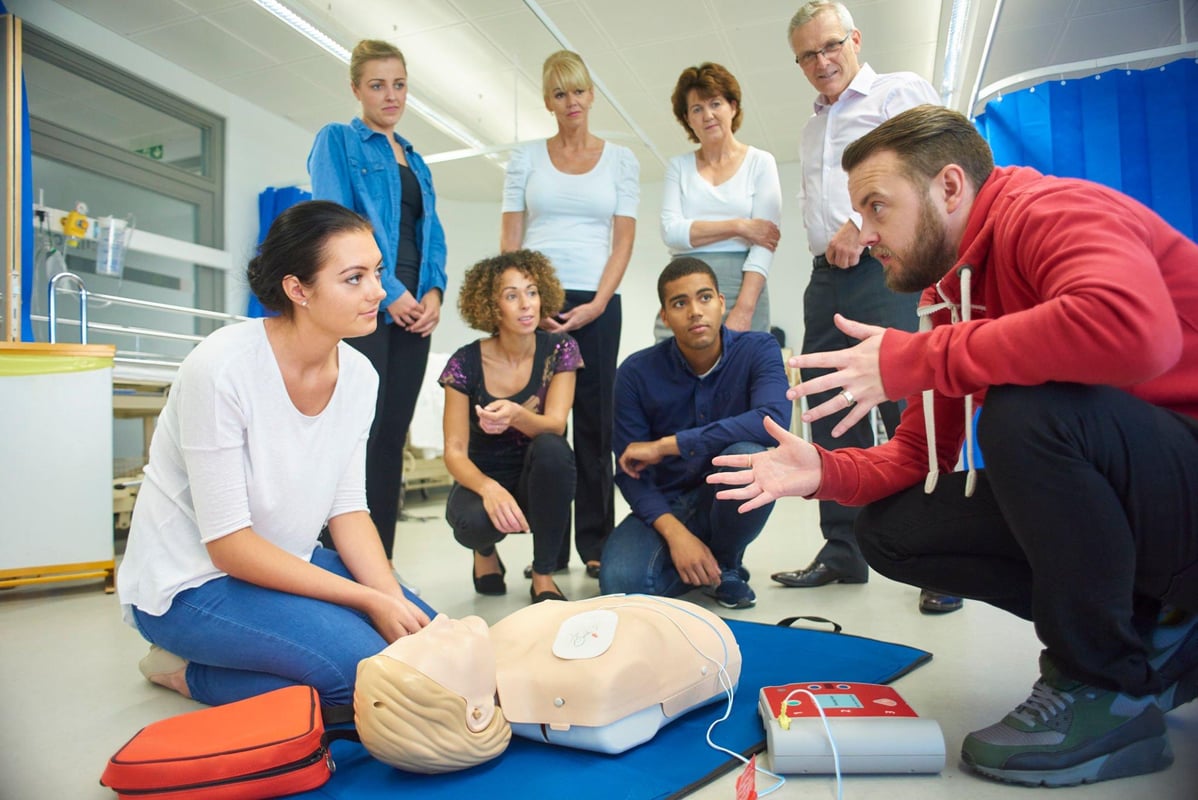
Financial aid (may be available)

Financial aid (may be available)

Financial aid (may be available)

Financial aid (may be available)
No cost info
No cost info
$1,300 total
$125 total
$85 total
No cost info
No cost info
No cost info
$36.50 total
No cost info
First Aid is a crucial skill that everyone should learn, regardless of their profession. It is not only crucial for those in the healthcare sector, but it may be a life-saver in a variety of everyday situations. With the right training, you can make a difference and potentially save a life. In this blog post, we will explore everything you need to know about First Aid classes in Austin, from what First Aid is, to the certification process, and how to find related jobs once you're certified.

First Aid is the immediate care given to someone who has been injured or is suddenly ill before professional medical help arrives. This early intervention can often reduce the severity of injuries, prevent complications, and in some cases, save a life. It’s essential to remember that the main goals of First Aid are to preserve life, prevent further harm, and promote recovery.
The requirements for First Aid training can vary depending on the organization providing the training. However, there are some common elements:
Basic understanding of common medical conditions and injuries
Understanding of the principles of First Aid and emergency response
Practical skills in essential First Aid procedures, such as CPR, wound care, and managing shock
When choosing a First Aid class, there are several factors to consider:
Certification: Ensure the course offers certification upon completion. This certification is proof that you have been trained in First Aid and can be vital when applying for jobs in healthcare or other related fields.
Content: The course should cover all essential aspects of First Aid, focusing on both theory and practical skills.
Instructors: Look for instructors with extensive experience in the field and a clear understanding of the course material.
First Aid classes typically include a mix of theoretical instruction and hands-on practice. Theoretical instruction may cover topics such as:
Understanding the human body and how it responds to injury or illness
Recognizing and responding to different types of emergencies
Practical sessions could include:
Learning and practicing CPR
Treating wounds and burns
Managing fractures and sprains
Upon successful completion of the training, students are usually required to pass a test to gain certification. This test often includes both a written examination and a practical evaluation, where students demonstrate their First Aid skills in simulated emergency situations.
Once you have your First Aid certification, you may find it easier to secure jobs in various fields. Some of these include:
Healthcare: Many roles in healthcare require First Aid training, including nursing, paramedicine, and caregiving.
Education: Teachers and school staff often need First Aid training to ensure the safety of students.
Hospitality and Recreation: Employees in these fields may need First Aid training to respond to emergencies at events or recreational facilities.
After gaining your First Aid certification, you might consider further training in related fields. Some potential options include becoming a Certified Medication Aide, becoming a Healthcare Administrator, or becoming a Pharmacy Technician. Each of these roles requires additional training but can provide excellent career opportunities.
First Aid is an essential skill in the workplace, especially in high-risk industries like construction, manufacturing, and transport. Having employees trained in First Aid can reduce the severity of workplace injuries and even save lives. It also fosters a safer and more caring work environment.
Children and infants require special consideration when it comes to First Aid. They are more susceptible to certain types of injuries, and their bodies respond differently to trauma. Therefore, if you frequently care for or work with children, consider taking a pediatric First Aid course.
Both online and in-person First Aid classes have their advantages. Online classes offer flexibility and convenience, allowing you to learn at your pace. However, in-person classes provide hands-on experience and immediate feedback, which can be invaluable when learning First Aid techniques.
Having a well-stocked First Aid kit is as important as having First Aid training. Ensure your kit includes bandages, antiseptic wipes, tweezers, medical tape, a digital thermometer, and disposable gloves, among other essentials.
First Aid is a vital skill that can save lives. Whether you're looking for a career in healthcare, or simply want to be prepared in an emergency, First Aid training is invaluable. Remember to choose a reputable course that offers certification, and consider further training in related fields to enhance your career prospects. Stay safe, and happy learning!
If you're exploring options in this field in various locations, Dreambound's extensive guides are a great resource. We've got detailed insights for numerous cities. check out some additional guides below:
Contemplating a change in your career path? Dreambound has written many comprehensive guides to aid you in making well-informed decisions.
Dreambound's platform allows prospective students to find the right educational program for them through searching, filtering, and connecting with our extensive selection of career & technical education partners.
Dreambound has over 70 programs across healthcare, technology, business, and industrial trades. This includes programs such as Medical Billing, Cybersecurity, and welding.
Some of our schools offer financial aid for those who qualify. Many others offer payment plans, where you can pay the cost of class over time.
Yes, Dreambound offers many online programs. On Dreambound's search, you can filter by online, in-person, and hybrid (part online, part in-person).
Dreambound is completely free for you to use! We are supported by schools and organizations who pay to advertise on our website, so we can offer all of our career resources for free.